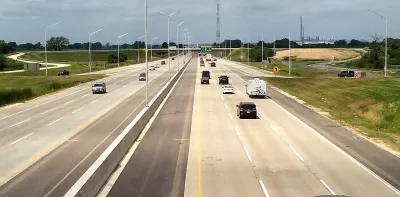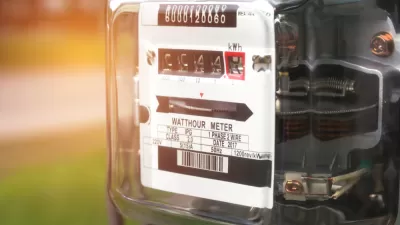Gov. J.B. Pritzker has a $134 billion problem in unfunded pension liabilities. Along with several other measures, his administration is considering selling state assets, including the Illinois Tollway, to fill the hole.

What differentiates the Pritzker approach to toll road leasing from others, such as the 2006 leasing of the Indiana Toll Road for $3.8 billion to meet a $3 billion transportation spending shortfall, as then-Gov. Mitch Daniels explained, is that the motivation doesn't stem from a need for improving transportation infrastructure.
Instead, it is driven by how to solve "the state's most vexing fiscal problem:" $134 billion in unfunded pension liabilities, according to Dan Petrella and Rick Pearson of the Chicago Tribune. While not the key component, it could play an important role.
The "cornerstone" of the plan to pay down the debt would be to transition from a flat income tax to a graduated system, but that would take two years to prepare as it must first go to the voters.
To provide a faster cash infusion, Gov. J.B. Pritzker wants to sell state assets and deposit the proceeds into the pension funds...Some of the state’s biggest holdings include the Illinois Toll Highway Authority, the Illinois Lottery and real estate such as the James R. Thompson Center in the Loop, among others.
The administration has yet to prepare a list of assets that could be sold. The Illinois Tollway, as the authority is called, may not even be placed on the list because of the time involved for the sale or lease of the 294 miles in five tollways that comprise the system, explained Deputy Gov. Dan Hynes at a meeting of the City Club of Chicago on Feb. 14.
“The tollway doesn’t really meet that standard, quite honestly, because that’s not something that could be done quickly,” he said. “There are bond covenants that are attached to the tollway. There’s complicated history and governance structure there. That’s really a long-term process.”
If sold or leased, it "would be the largest privatization of a government asset in state history, and this isn’t the first time it has been discussed as part of dealing with a burgeoning public employee pension debt," add Petrella and Pearson.
In April 2006, then-Gov. Rod Blagojevich — who’s now in federal prison — opened the door to consider such a move, fueled by then-Mayor Richard M. Daley’s $1.8 billion privatization deal of the Chicago Skyway
At the time, it was estimated privatization of the tollway could generate as much as $24 billion for the state. Such a figure, even at the 2006 estimate, represents nearly 18 percent of the state’s current unfunded pension liability of about $134 billion.
Petrella and Pearson provide additional information on the Illinois Tollway. Tolls would need to be allowed to increase to provide a better sale price, which would have political ramifications.
When Blagojevich introduced the issue, Republican leaders warned him of the potential backlash from suburban drivers who might have little protection from seeing tolls boosted by a private operator.
More will be known when Gov. Pritzker delivers his first budget speech on Wednesday. This correspondent will be surprised to see tollway privatization remain a consideration for lowering pension debt considering the practical and political challenges such a sale would entail.
Then again, the Democratic governor's financial challenges are formidable. In addition to having to lower the $134 billion pension liability, his Republican predecessor left him a $3.2 billion budget deficit for the upcoming fiscal year, "16 percent more than the Rauner administration estimated in November," according to his office.
Related in Planetizen:
-
When Red States Turn Blue, February 7, 2019
-
Vehicle Miles Traveled Fee Becomes Debate Issue in Illinois Gubernatorial Race, September 27, 2018
Hat tip to Evan Craig.
FULL STORY: Gov. J.B. Pritzker's administration considering selling state buildings and land to pay for pensions

Alabama: Trump Terminates Settlements for Black Communities Harmed By Raw Sewage
Trump deemed the landmark civil rights agreement “illegal DEI and environmental justice policy.”

Planetizen Federal Action Tracker
A weekly monitor of how Trump’s orders and actions are impacting planners and planning in America.

The 120 Year Old Tiny Home Villages That Sheltered San Francisco’s Earthquake Refugees
More than a century ago, San Francisco mobilized to house thousands of residents displaced by the 1906 earthquake. Could their strategy offer a model for the present?

Ken Jennings Launches Transit Web Series
The Jeopardy champ wants you to ride public transit.

BLM To Rescind Public Lands Rule
The change will downgrade conservation, once again putting federal land at risk for mining and other extractive uses.

Indy Neighborhood Group Builds Temporary Multi-Use Path
Community members, aided in part by funding from the city, repurposed a vehicle lane to create a protected bike and pedestrian path for the summer season.
Urban Design for Planners 1: Software Tools
This six-course series explores essential urban design concepts using open source software and equips planners with the tools they need to participate fully in the urban design process.
Planning for Universal Design
Learn the tools for implementing Universal Design in planning regulations.
Clanton & Associates, Inc.
Jessamine County Fiscal Court
Institute for Housing and Urban Development Studies (IHS)
City of Grandview
Harvard GSD Executive Education
Toledo-Lucas County Plan Commissions
Salt Lake City
NYU Wagner Graduate School of Public Service





























